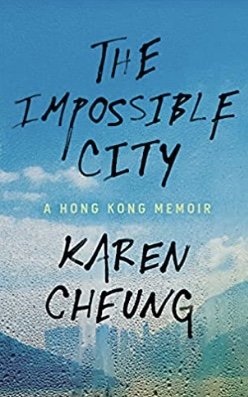The Impossible City: A Hong Kong Memoir by Karen Cheung (Random House)
Karen Cheung was four years old in 1997 when Hong Kong’s handover took place. She grew up believing that the policy of “One country, two systems” would be in place for 50 years and that Hong Kong was protected by the rule of law. The Sino-British Joint Declaration stated that Hong Kong people would administer Hong Kong. Hong Kong’s chief executive would be elected by its citizens or through local caucuses, a policy that would lead to universal suffrage and democracy. When this failed to take place, protests against a national security bill that would ban “sedition, treason, subversion, and secession,” began in 2003. From then on, Hong Kong held a thriving community of activists and dissidents.
There was much to protest, much to change: Hong Kong’s “land problem” that led to high rents, squalid housing, and government confiscation of rural villages; mental health care that was largely inaccessible even to affluent expatriates; and a disregard that bordered on intolerance for “non-conformist art.” When the protests of 2003 made Hong Kong’s chief executive withdraw the controversial national security bill and resign from office, it seemed as though change was possible. Instead the problems grew worse.
Cheung grows up without a strong identification as a Hong Kong citizen. Until she turns 18, she is shaped by her grandmother’s Chinese customs and Taoist traditions and by the English language that she’ s steeped in at an international school for six years. When she transfers to a public school run by Christians, where students are allowed to speak Cantonese, the curriculum is taught in English. After six years there, Cheung is fluent in English and the English literature that she has read compulsively convinces her that Western culture is superior. In Kowloon where 90% of the population is Chinese and English is considered “a snobbish anomaly”, she longs for a life in London or New York. When she at last goes to the island of Hong Kong and enters Hong Kong University which is “vaguely international,” she feels a step closer to the life she wants. In 2014 she spends a semester in Glasgow and watches the Umbrella Revolution from another country, suddenly and painfully realizing her home is in Hong Kong, the place where her life is waiting. “We recognize all of its imperfections, and still refuse to walk away.”
The subtitle of The Impossible City says it’s a Hong Kong memoir and that’s exactly what it is. “This book is about the many ways a city can disappear,” Cheung says. Her own story is told merely as a fragment of life in Hong Kong, used as an illustration in “documenting disappearances.” Her personal narrative gives depth to the stranglehold tycoons have on Hong Kong’s real estate, showing how extreme wealth controls everything from housing to public services. To gain an apartment in government-subsidized housing can mean a five-year wait; instead people rent bunk-bed spaces in illegally subdivided apartments for over 400 US dollars a month. Others sleep in Japanese-inspired “space capsules” or in “caged homes,” beds surrounded by barbed wire. SARS and a long period of political protests give rise to depression and PTSD.
Student suicides rise by 76% in the years between 2012 and 2016. “There are only around four hundred psychiatrists in a city of over seven million people.” where a government census showed “one in seven Hong Kongers live with mental health conditions.”
“What unites Hong Kongers,” Cheung says, “is pain.” Suicidal herself, she finds a new life in the creative energy and freedom of the city’s indie music scene. Surrounded by people who live “alternate lives” in a version of Hong Kong that Cheung wants to inhabit, she finds her way to the industrial buildings of East Kowloon and begins to write about what she hears and sees there. “Music is the archive of the times,” she says. From there she begins recording other forms of archives in Still/Loud, an online magazine that focuses on Hong Kong’s culture, not its lifestyle.
Her examination of expat and Asian American writers who dominate Hong Kong’s English-language journalism and literature, reporting and telling stories “through their lens,” is scathing. Hong Kong locals who write in English, as Cheung does, are frequently mistaken for members of the diaspora, usually as Asian Americans, and she is told by a newspaper editor to write stories that can be understood by “a Texas grandfather.” After three of her essays are published in the New York Times, other publications ask for pieces that tell “how it feels” to live in political turmoil. As a Hong Kong writer with English fluency, writing for “the foreign gaze,” Cheung frequently feels like “a language traitor…betraying her mother tongue.”
Protests against a new version of the 2003 anti-sedition bill in 2019 are halted by Covid. On June 30, 2020 the bill becomes law. National security police scour the city for forms of dissidence while police hotlines welcome people who will report on neighbors who breach the law. The maximum sentence for this is life imprisonment.
Although employees who work in city government offices take loyalty oaths and teachers are given “patriotic syllabi” for their classrooms, a writer on Twitter claims “It’s absolutely not that bad for the average Hong Konger…that is 99% of the population.” For Cheung and her friends, “Are you leaving?” is a frequent question. Cheung’s reply is “I’m not ready.” She’s still recording what she knows will disappear. “Hong Kong,” she says, “will be physically unchanged but there will be nobody here that remembers the place that once existed….The only ones left {will be} those who believe this is the best version of Hong Kong there could ever be.” In showing the possibility that’s been taken away, The Impossible City is a record of what’s been lost. But, Cheung says with more than a trace of irony, “We are always so attuned to loss in this city.”~Janet Brown
